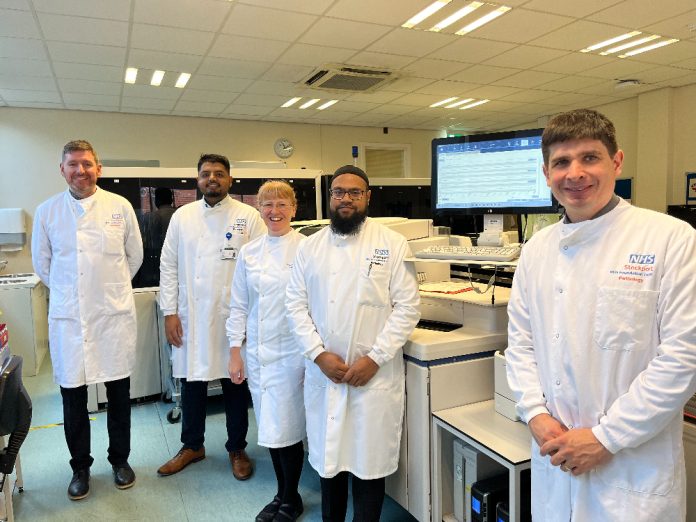Pathology services at Stepping Hill Hospital will soon be joining a new laboratory information system (LIMS) which will enable them to work more collaboratively and improve services for both patients and clinicians.
Stockport NHS Foundation Trust has joined with three other trusts in the Greater Manchester Pathology Network; Bolton, Tameside and Glossop Integrated Services, and the Northern Care Alliance, to introduce the new LIMS system from Clinisys, which is set to revolutionise the way in which medical information is shared, leading to faster diagnosis and treatment for patients.
The Greater Manchester Pathology Network is one of the largest pathology networks in England. It serves an estimated 2.8 million people from a total of seven NHS Trusts. Collectively, they conduct more than 71.4 million tests every year. Stockport NHS Foundation Trust alone conducts over 4 million tests. Despite this, the area’s laboratories are currently working with a mix of laboratory information management systems, some of which have reached the end of their life.
In a series of tenders Stockport, the NCA, Stockport, Bolton and Tameside and Glossop all awarded to Clinisys for their WinPath system and plans are now being developed to interface the systems to create an “integrated, interoperable LIMS service” across the network.’
Katie Moss, programme director for the Greater Manchester Pathology Network, said: “The idea is that there should be a standardised system at each organisation and a standard interface across Greater Manchester, so we can view patient results in the Greater Manchester Care Record (GMCR) from all electronic patient records (EPRs).
“That should help to reduce unwarranted variation in the way tests are conducted and reported, supporting a more collaborative way of working. It should also make it easier for clinicians to see if a patient has had a test taken already, so they can avoid repeating the test or use the results to reach a faster diagnosis or treatment decision.”
Now, work is underway to make sure these systems use the same test lists, coding and naming conventions. The Greater Manchester Pathology Network are planning to have the new LIMS service in place by the end of 2024/25.
Katie Moss added: “The new LIMS service will open up a lot of opportunities across Greater Manchester.
“We have talked about more collaborative working for a long time, and during COVID-19 it really started to happen. Nobody wanted to have to go through a pandemic, but it did encourage pathology services to work together. Now, we want to work on the same platform, using the same workflow, so we can help each other, deliver the benefits of system-wide reporting, and level up across the region.”
The new approach will also support the development of the network. In response to two reports by Lord Carter of Coles, NHS England has been encouraging laboratories to form pathology networks to improve efficiency and quality.
Mike Allison, Stockport NHS Foundation Trust Divisional Director for Clinical Support Services said “We are absolutely delighted that our pathology services are set to be part of the new LIMS system from Clinysis for the Greater Manchester Pathology Network. This will help to make pathology results more user-friendly for our clinicians, and help us to work more closely with colleagues from across the network.
“Our colleagues are currently working well to introduce this new system, and look forward to them being fully operational in 2024/25. The ultimate result of this will mean swifter diagnosis for all our patients, which we hope will improve the quality of lives, and indeed save lives.”
Tony Oliver, programme director and clinical safety officer at Clinisys, said: “Greater Manchester Pathology Network is a big and a complex environment to be working in, but we are fully committed to supporting its emerging approach to harmonising working practices and encouraging collaboration across the system.
“We have a master build for Clinisys WinPath that encourages standardisation, based on best practice from laboratories across the UK. That should help the network to realise its ambitions, while enabling trusts to customise the LIMS to work for them.
“It’s great to see that clinicians in Greater Manchester are starting to work together on a vision of what an interoperable LIMS service could do for them and their patients. There are significant efficiency and quality benefits to be achieved, and we look forward to helping to deliver them.”







